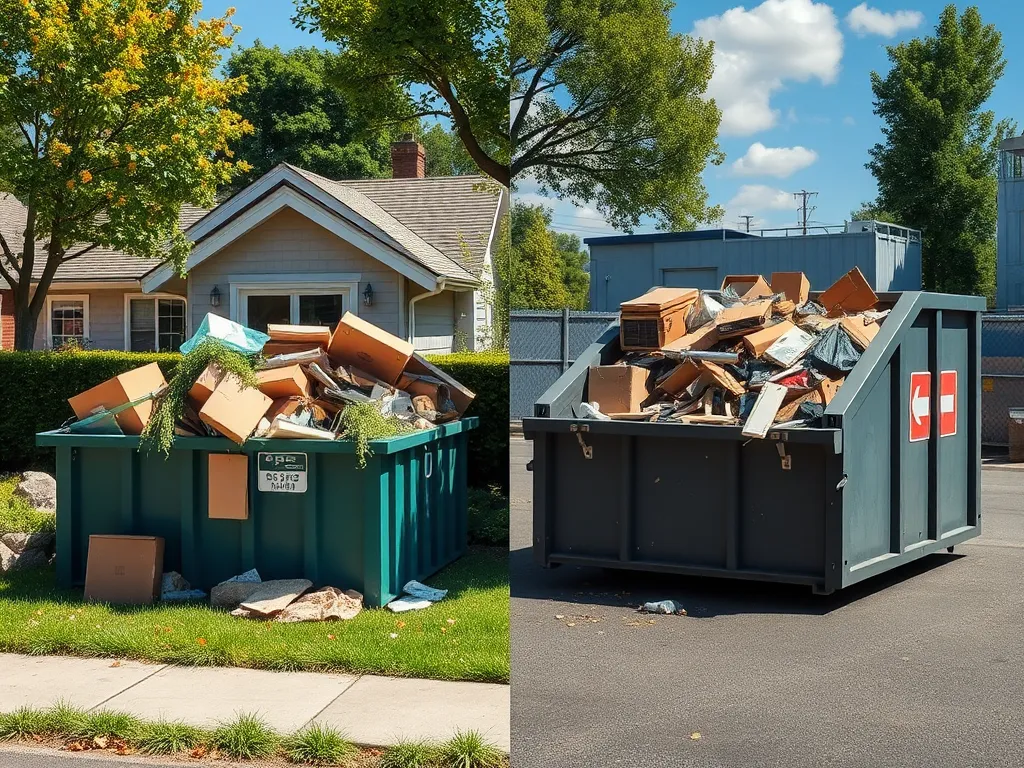Understanding Residential vs. Commercial Dumpsters: A Guide

Residential vs. Commercial Dumpsters: Understanding the Differences
When it comes to waste management, choosing the right dumpster is crucial for efficiency and cost-effectiveness. Residential vs. commercial dumpsters serve different purposes, catering to varied needs based on the scale and type of project involved. Understanding these differences can help homeowners and business owners make informed decisions about their waste disposal solutions.
Residential dumpsters are typically smaller and designed to handle the waste generated from home improvement projects, cleanouts, or general household waste. In contrast, commercial dumpsters are larger and designed to accommodate the more substantial waste produced by businesses, construction sites, or events. Recognizing the specific requirements of each type can save time, money, and ensure proper waste management practices are followed.
The size, weight capacity, and rental duration differ between residential and commercial dumpsters. Residential dumpsters may come in 10 to 20-yard sizes, while commercial options can range from 20 to 40 yards or more. Moreover, commercial rentals often involve longer contracts and specific regulations dictated by local authorities, adding another layer of complexity to waste disposal for businesses.
Both residential and commercial dumpsters play a vital role in promoting effective waste disposal and recycling efforts. However, their usability comes with distinct guidelines. Residential users may have fewer restrictions and a more straightforward rental process, while commercial users might encounter more regulations, including the need for permits and adherence to zoning laws regarding placement and accessibility.
To effectively manage waste in your community, it’s essential to understand the Different Kinds of Trash Bins available.
Understanding the differentiation between residential vs. commercial dumpsters can make a substantial difference in managing waste effectively. Homeowners should seek options that fit their home renovation or clean-out projects, while businesses must consider the volume and type of waste generated to select the most suitable dumpster solution for their operational needs.
Types of Dumpsters
Standard residential dumpsters are usually available in smaller sizes, such as 10, 15, or 20 yards, and are ideal for home projects such as cleaning out garages, landscaping, or renovations. These dumpsters are typically placed on driveways or yards and have specific weight limits.
Commercial roll-off dumpsters are larger, often ranging from 20 to 40 yards and designed for heavy-duty use. These dumpsters are perfect for construction sites, large events, or ongoing business waste disposal. They are rolled on and off trucks for easy transport and require careful placement to ensure accessibility.
Specialty dumpsters for construction sites are designed to handle specific types of waste, such as concrete, debris, or hazardous materials. These dumpsters help ensure compliance with safety regulations and proper disposal methods for potentially harmful materials.
Compact vs. large dumpsters also play a role in choosing the right option. Compact dumpsters are suited for smaller projects, while larger dumpsters accommodate bulk waste and are ideal for significant renovations or commercial-grade waste disposal.
Recycling and waste management options are critical for both residential and commercial dumpsters. Many providers offer separate bins for recycling materials, ensuring that waste management is not just about disposal but also about sustainable practices.
Cost Comparison
The pricing structure for residential dumpsters typically involves a flat fee that includes delivery, pick-up, and disposal costs. However, the total cost may vary based on factors such as the size of the dumpster and rental duration.
For commercial dumpsters, costs can fluctuate significantly depending on the volume of waste generated, the frequency of pickups required, and any regulatory costs that may apply. Businesses often negotiate contracts for better rates due to their consistent waste generation.
It’s important to be aware of hidden fees when renting dumpsters. Charges can sneak in for overloading the dumpster, additional weight limits, and disposal of hazardous waste, which can lead to unexpected costs.
Average rental prices for residential dumpsters usually range from $300 to $600, depending on size and location. Conversely, commercial dumpster rentals may cost from $500 upwards, with pricing tailored to disposal needs and service contracts.
Cost-saving tips for choosing dumpsters include comparing quotes from multiple providers, understanding what’s included in rental agreements, and being clear about the type of waste you’ll be disposing of to avoid added fees.
Usage Guidelines
Best practices for residential dumpster use involve planning for placement, ensuring easy access, and avoiding overloading. Homeowners should be aware of neighborhood guidelines regarding aesthetics and placement of dumpsters.
Commercial dumpster regulations often require permits, especially in busy urban areas. Business owners must ensure compliance with local laws and have appropriate plans for regular maintenance and service.
Limitations and restrictions vary based on the type of dumpster. For example, certain materials, such as e-waste, hazardous materials, and certain liquids, may be prohibited in dumpsters. Always check with the rental company on specific restrictions before disposal.
Understanding what can and cannot be disposed of in dumpsters is imperative. Residential users might have more leeway, but businesses can face significant penalties for improper disposal of restricted materials.
Time frames for dumpster rental typically vary; residential rentals may be short-term for specific projects, while commercial rentals often involve long-term contracts to manage ongoing waste disposal needs.
Environmental Impact
Waste reduction strategies for residential areas can involve using smaller self-service dumpsters and promoting recycling efforts within communities. Households can make meaningful changes by sorting waste and reducing overall disposal volumes.
Commercial waste management practices focus on creating sustainability plans, ensuring that businesses are committed to disposing of waste effectively while also minimizing the environmental impact of their operations.
The benefits of recycling in commercial dumpsters cannot be overstated. Businesses that utilize recycling programs can reduce their waste footprint while potentially saving on disposal costs by diverting recyclable materials from landfills.
Eco-friendly disposal methods such as composting organic waste or procuring services that specialize in donating usable items can profoundly impact both residential and commercial waste management initiatives.
Local regulations on waste disposal can differ significantly, requiring residential and commercial users to stay informed and compliant. Understanding these laws is essential to avoid penalties and promote sustainable practices.
Choosing the Right Dumpster
Factors to consider for residential dumpsters include the type of waste being disposed of, the size of the project, accessibility to the dumpster, and the rental duration desired.
Key considerations for commercial options involve analyzing waste output, understanding the required frequency of pickups, and navigating local laws regarding waste disposal and zoning regulations.
Size and capacity requirements must reflect the volume of waste expected. Residential projects should allow extra space for unforeseen waste outputs, while commercial needs should factor in consistent waste rates.
Duration of rental is also important, as residential needs might be short-term, while ongoing commercial projects benefit from long-term contractual agreements for ease of management.
Choosing based on project type can streamline the process. Homeowners are advised to seek out local providers who specialize in residential rentals, while businesses should align with commercial service providers who understand their specific needs.
